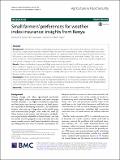| dc.contributor.author | Kenneth W Sibiko, Prakashan C Veettil, Matin Qaim | |
| dc.date.accessioned | 2020-08-27T08:23:38Z | |
| dc.date.available | 2020-08-27T08:23:38Z | |
| dc.date.issued | 2018-12-01 | |
| dc.identifier.uri | https://repository.maseno.ac.ke/handle/123456789/2428 | |
| dc.description.abstract | Background
Smallholder farmers in developing countries are particularly vulnerable to climate shocks but often lack access to agricultural insurance. Weather index insurance (WII) could reduce some of the problems associated with traditional, indemnity-based insurance programs, but uptake has been lower than expected. One reason is that WII contracts are not yet sufficiently tailored to the needs and preferences of smallholder farmers. This study combines survey and choice-experimental data from Kenya to analyze the experience with an existing WII program and how specific changes in the contractual design might encourage uptake.
Results
Many smallholders struggle with fully understanding the functioning of the program, which undermines their confidence. Regular provision of relevant rainfall measurements and thresholds would significantly … | en_US |
| dc.publisher | BioMed Central | en_US |
| dc.subject | Climate risk, Smallholder farmers, Crop insurance, Discrete choice experiment, Africa | en_US |
| dc.title | Small farmers’ preferences for weather index insurance: insights from Kenya | en_US |
| dc.type | Article | en_US |

